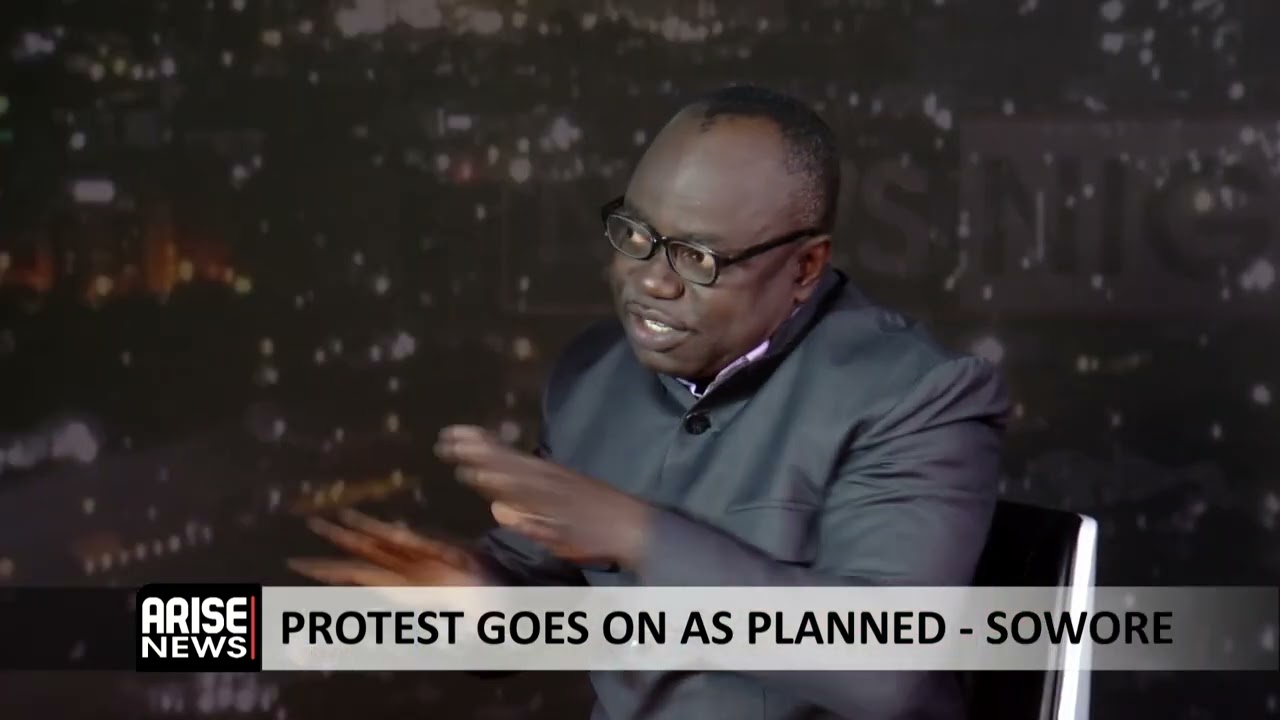
Lawyer and public affairs analyst Frank Tietie has said nothing legally stops Nigerians from staging peaceful protests, insisting that the right to freedom of expression and assembly is constitutionally guaranteed.
Speaking in an interview with ARISE News on Sunday, Tietie said despite a recent court order restricting protesters from approaching specific areas in Abuja, there is no legal barrier against holding demonstrations elsewhere.
“Nothing effectively stands against the protest, despite the said order that was issued,” he said. “The order was restrictive as to geographical locations that Omoyele Sowore shouldn’t go to — and that’s where the controversy stems from. So Sowore is right when he says nothing stops the protest from going on.”
He explained that the government had sought a court order out of fear of unrest, particularly around sensitive national sites.
“The government and its agents, out of trepidation and fear of the unknown, approached the court to say that it would breach national security if protesters went to areas like the Presidential Villa, the National Assembly and Shehu Shagari Way,” Tietie said.
“While it’s understandable to restrict access to the Villa, completely fencing off symbolic spaces like Unity Fountain or Eagle Square is unacceptable.”
Tietie, who is also a human rights advocate, said the right to protest is fundamental and cannot be suppressed.
“Protest is a right under Sections 39 and 40 of the Constitution,” he stressed. “People must be allowed to express themselves. APC-led governments, from the Buhari era to now, have shown excessive fear of protests, even though they themselves rode on protests to power.”
He argued that protests should be seen as healthy expressions of public grievance, not threats to national security.
“Governments must allow people to vent their disagreements at every level and in any location,” he said. “It’s an opportunity to take the wind out of the sail of violence. When you constantly stifle citizens, don’t expect them to demonstrate in the bush — they want the world to see them.”
Tietie also commented on the continued detention of Indigenous People of Biafra (IPOB) leader, Nnamdi Kanu, saying the Federal Government should have long released him or at least obeyed subsisting court orders.
“At one point, the Court of Appeal ordered Kanu’s discharge and acquittal, and at that stage, he should have been released,” he said. “Even though the Supreme Court later reversed that decision, the government could still have exercised discretion through the President’s prerogative of mercy.”
He criticised calls for the review of recent presidential pardons, arguing that such powers are constitutional and not subject to challenge.
“Whatever crime it is, if the President decides to pardon someone, nobody can question it,” he said. “But it is telling that this pardon did not extend to someone like Nnamdi Kanu, who commands massive followership and whose continued detention affects security in the South-East.”
Tietie said Kanu’s long detention without conclusion of trial was unjustifiable.
“You cannot arrest a man illegally, keep him in detention for five years while others charged with similar or worse crimes have been tried and sentenced,” he said. “The South-East remains tense — I just returned from there. The Monday shutdowns are still in place. The man demands justice; have him released, and address the president on that ground. That’s a fair demonstration.”
Tietie praised activist Omoyele Sowore as one of the few remaining Nigerians who continue to stand for justice and integrity.
“Omoyele Sowore is about the only last man standing when it comes to integrity in pursuing a cause for the people,” he said. “He has laid down his life for the liberation of this country. He is not someone you intimidate with force — he welcomes it. If you threaten him with violence, he’s happy because he believes in the struggle.”
He urged the government to engage Sowore meaningfully rather than repress him.
“He is a puritanical unionist who believes in genuine causes, not politics,” Tietie added. “The government should engage him, not intimidate him.”
Commenting on judicial restrictions on protests, Tietie argued that no court should prevent citizens from demonstrating before the National Assembly, which represents the people.
“Nothing should stop a Nigerian from protesting anywhere,” he said. “The court rightly recognised it cannot reduce citizens’ rights under Sections 39 and 40 of the Constitution. However, the government must stop stifling protests — because when you deny people peaceful expression, you invite frustration and possibly violence.”
He commended security agencies for restraint in recent times, saying dialogue and civil engagement remain the best paths to peace.
“I commend the DSS for recently exercising restraint with groups that declared a ‘shadow government’ instead of resorting to arrests,” he said. “It shows we can handle dissent responsibly. The government must adopt such civility in its dealings with activists like Sowore.”
Tietie concluded that the right to protest must be respected as a vital component of democracy.
“If the government constantly stifles Nigerians from demonstrating, it will only breed resentment,” he warned. “Let people protest where the world can see them — Unity Fountain, Eagle Square — not hide in fear of their own citizens.”
Boluwatife Enome

